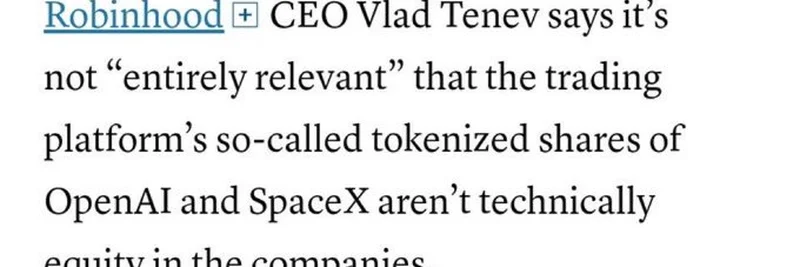Hey there, crypto enthusiasts and blockchain buffs! If you’ve been keeping an eye on the latest buzz in the trading world, you’ve probably stumbled across a hot topic from Robinhood’s CEO, Vlad Tenev. In a recent tweet by edgarpavlovsky, Tenev dropped a bombshell: the so-called "tokenized shares" of OpenAI and SpaceX on Robinhood’s platform aren’t technically equity in the companies. Let’s dive into what this means and why it’s sparking so much conversation!
What Are Tokenized Shares, Anyway?
First things first—let’s break it down. Tokenized shares are digital assets created using blockchain technology that represent ownership in a company, much like traditional stocks. However, unlike stocks traded on centralized exchanges like the NYSE, tokenized shares live on a blockchain, often in your digital wallet. Robinhood has rolled out these tokenized shares for private giants like OpenAI and SpaceX, especially in Europe, where regulations are a bit more flexible.
But here’s the kicker: Tenev says it’s “not entirely relevant” that these tokens aren’t actual equity. Why? Because the market doesn’t seem to care! People are jumping in to speculate, and that’s driving the action. It’s less about owning a piece of the company and more about riding the wave of potential value.
The OpenAI and SpaceX Twist
OpenAI and SpaceX are household names, but they’re not publicly traded—until now, access to their equity was limited to insiders or super-wealthy investors. Robinhood’s move to tokenize their shares opens the door for everyday traders, especially in the EU, where they’re even giving away 5 euros worth of tokens to new users. This has sent Robinhood’s stock soaring to a record high, proving the hype is real.
Yet, Tenev’s point is clear: these tokens don’t come with the same rights as traditional equity, like voting or dividends. They’re more like a bet on the companies’ future success, powered by blockchain’s speed and accessibility. Think of it as a meme token with a fancy pedigree—fun to trade, but not the full ownership package.
Why It Matters to Blockchain Practitioners
For those of us in the blockchain and meme token space, this is a game-changer. It shows how blockchain can democratize access to high-profile investments, even if the legal fine print lags behind. At meme-insider.com, we’re all about keeping you ahead of the curve, and this move hints at a future where tokenized assets could rival traditional markets. Plus, with Robinhood’s layer 2 blockchain on Arbitrum, the tech infrastructure is getting a serious upgrade.
But let’s be real—there’s risk here. If these tokens aren’t equity, their value could swing wildly based on speculation, much like the wild rides we see with meme coins. It’s a reminder to do your homework and understand the smart contracts behind these assets.
The Community Weighs In
The tweet didn’t stop with Tenev’s statement. Avery Hope chimed in, agreeing with Tenev and noting the booming speculative market. It’s a sentiment echoed across the crypto community: people love a good gamble, and tokenized shares are the latest playground. Whether this trend holds long-term depends on regulation and investor trust—something we’ll keep tracking here.
What’s Next?
So, is this the future of trading, or just a flashy experiment? Vlad Tenev seems to think blockchain can unlock broader participation, but U.S. users are still waiting due to regulatory hurdles. For now, Europe’s leading the charge, and it’s a fascinating case study for anyone in the meme token or blockchain space.
Stay tuned to meme-insider.com for more updates on tokenized shares, meme tokens, and the evolving world of crypto trading. Got thoughts on this? Drop them in the comments—we’d love to hear from you!



